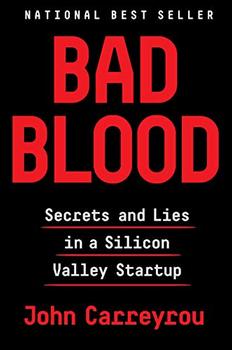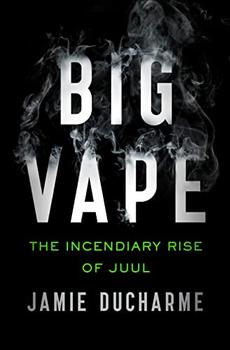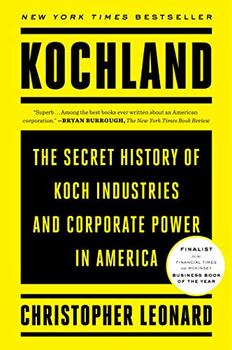Summary | Excerpt | Reading Guide | Reviews | Beyond the book | Read-Alikes | Genres & Themes | Author Bio

Secrets and Lies in a Silicon Valley Startup
by John CarreyrouIn February 2015, a blogger for a pathology website contacted John Carreyrou, a Pulitzer Prize-winning investigative journalist for the Wall Street Journal. He claimed that his recent post expressing skepticism about a company named Theranos had led to a group of people contacting him with information about the organization. They thought Carreyrou might be interested in following up. He did, and after months of careful research, countless interviews, and threats from Theranos lawyers, he published a series of damning articles about the company and its board. Bad Blood: Secrets and Lies in a Silicon Valley Startup is a book-length treatment of Carreyrou's Wall Street Journal exposé as well as further investigations sparked by his work.
Theranos was the brain-child of Elizabeth Holmes who at the age of 19 dropped out of Stanford University to pursue an idea of making blood tests easier and less expensive for consumers. An incredibly charismatic and driven woman, Holmes quickly raised $700 million to develop the technology. Eventually she asserted that the equipment she designed could run over 800 tests on a single drop of blood, that its technology was more accurate than traditional lab testing, and that results were ready in less than 30 minutes. The problem was that not one of those claims was true. Nevertheless, by the time Carreyrou exposed the company as a fraud its equipment was being widely relied on, such as by drug manufacturers to test blood during clinical trials.
Immunoassays are performed over 100 million times a year worldwide, and they're big business – companies that provide immunoassay services (for example, for physicians and pharmaceutical companies) earned an estimated $17 trillion in 2012. Theranos, of course, tried to get a slice of this very lucrative pie. At a very basic level, Theranos's technology failed because in order to run numerous tests simultaneously on a very small amount of blood (Holmes at one point claimed up to 800 tests from a simple finger-stick) the material had to be diluted extensively. With such a tiny sample to run against, the distribution of the specific analyte being measured became skewed, producing wildly varying and frequently inaccurate results.
The first part of Carreyrou's account outlines everything he was able to learn about Theranos, Holmes, and other principals responsible for the company's success, such as Ramesh "Sunny" Balwani, its president and COO at the time (and also Holmes' lover.) It's pretty much a non-stop, stomach-turning litany of deception and intimidation (one employee was driven to suicide by the strong-arm tactics employed against anyone who made waves.) By the point in the book where Carreyrou is tipped off, I found myself rooting for someone - anyone - to take these really repulsive people down; I almost cheered out loud at his involvement. The remainder of the book illustrates how he was able to glean enough information about the company to make his case, and the lengths to which Theranos went to keep from being outed.
This highly readable book may be about big business, but it reads like a true crime thriller. The pages flew by as I held my breath, waiting to see what unbelievable act Balwani would perpetrate next, or what incredible claim Holmes would make to secure funding. If the author wasn't such a well-regarded journalist this story would be hard to believe; some of the principals' acts are truly jaw-dropping. A film version of the story starring Jennifer Lawrence is in the works – a testament to the fact that this is truly a riveting tale.
Two areas in Bad Blood left me unsatisfied, however, neither of which can be blamed on the author. First, although Theranos was clearly on the verge of collapse when the book was published in May 2018, the story wasn't over; the company didn't shut its doors until August 2018 and legal action was still pending at of the end of 2018. I wanted the rest of the story and some sense of justice, but certainly that final chapter is years off. Secondly, I badly wanted to know if Holmes was a greedy sociopath or just a narcissist, either deliberately ignoring the potential harm she was causing others or simply living in her own reality. She wouldn't grant interviews, so we only get an outsider's sketch of her character, and good journalists don't speculate where no evidence exists – but I still wanted some clue as to why she felt her actions were reasonable.
Carreyrou's work has won many accolades; his Wall Street Journal articles on Theranos won the George Polk Award for Financial Reporting, and Bad Blood was awarded the Financial Times and McKinsey Business Book of the Year Award. It also appeared on many "best of" lists for 2018 - including BookBrowse's. My vote can be added; I certainly found it to be one of the finest non-fiction accounts I've read, and I highly recommend it to those interested in cautionary tales about the business world, or great non-fiction reads in general.
![]() This review was originally published in The BookBrowse Review in December 2018, and has been updated for the
February 2020 edition.
Click here to go to this issue.
This review was originally published in The BookBrowse Review in December 2018, and has been updated for the
February 2020 edition.
Click here to go to this issue.

If you liked Bad Blood, try these:

by Jamie Ducharme
Published 2022
A propulsive, eye-opening work of reporting, chronicling the rise of Juul and the birth of a new addiction.

by Christopher Leonard
Published 2020
Just as Steve Coll told the story of globalization through ExxonMobil and Andrew Ross Sorkin told the story of Wall Street excess through Too Big to Fail, Christopher Leonard's Kochland uses the extraordinary account of how one of the biggest private companies in the world grew to be that big to tell the story of modern corporate America.
Your guide toexceptional books
BookBrowse seeks out and recommends the best in contemporary fiction and nonfiction—books that not only engage and entertain but also deepen our understanding of ourselves and the world around us.